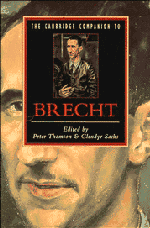Book contents
- Frontmatter
- PART 1 CONTEXT AND LIFE
- PART 2 THE PLAYS
- PART 3 THEORIES AND PRACTICES
- 13 Brecht and the Berliner Ensemble -- the making of a model
- 14 Key words in Brecht's theory and practice of theatre
- 15 Brecht's poetry
- 16 Brecht and music: theory and practice
- 17 Brecht and stage design: the Bühnenbildner and the Bühnenbauer
- 18 Actors on Brecht
- 19 Brecht's legacy
- Bibliography
- Index of Works
- General Index
18 - Actors on Brecht
from PART 3 - THEORIES AND PRACTICES
Published online by Cambridge University Press: 28 May 2006
- Frontmatter
- PART 1 CONTEXT AND LIFE
- PART 2 THE PLAYS
- PART 3 THEORIES AND PRACTICES
- 13 Brecht and the Berliner Ensemble -- the making of a model
- 14 Key words in Brecht's theory and practice of theatre
- 15 Brecht's poetry
- 16 Brecht and music: theory and practice
- 17 Brecht and stage design: the Bühnenbildner and the Bühnenbauer
- 18 Actors on Brecht
- 19 Brecht's legacy
- Bibliography
- Index of Works
- General Index
Summary
One of Brecht's favourite sayings was: 'The proof of the pudding is in the eating.' Although his essays, poems and plays tell us a great deal about both his aesthetics and his dramatic theories, it is to his practice (and to that of others engaged in performing his work) that we must turn for meaningful insight into Brechtian performance. The aim of this essay is to examine the implications of Brechtian theory and practice for the performer. This will be done by means of a brief discussion of Brecht's ideas on acting, followed by a fuller consideration of the views and experiences of actors who have played major roles in Brecht's plays.
Brecht was first and foremost a man of the theatre, a playwright who also directed, so that one might well suppose that without his sixteen years in exile, during which time the practice of his directorial skills was necessarily limited, the world would have received many fewer words about his dramatic theory. Certainly as a director Brecht seems to have referred very little even to the most famous of his theoretical ideas.
- Type
- Chapter
- Information
- The Cambridge Companion to Brecht , pp. 254 - 272Publisher: Cambridge University PressPrint publication year: 1994
- 3
- Cited by

